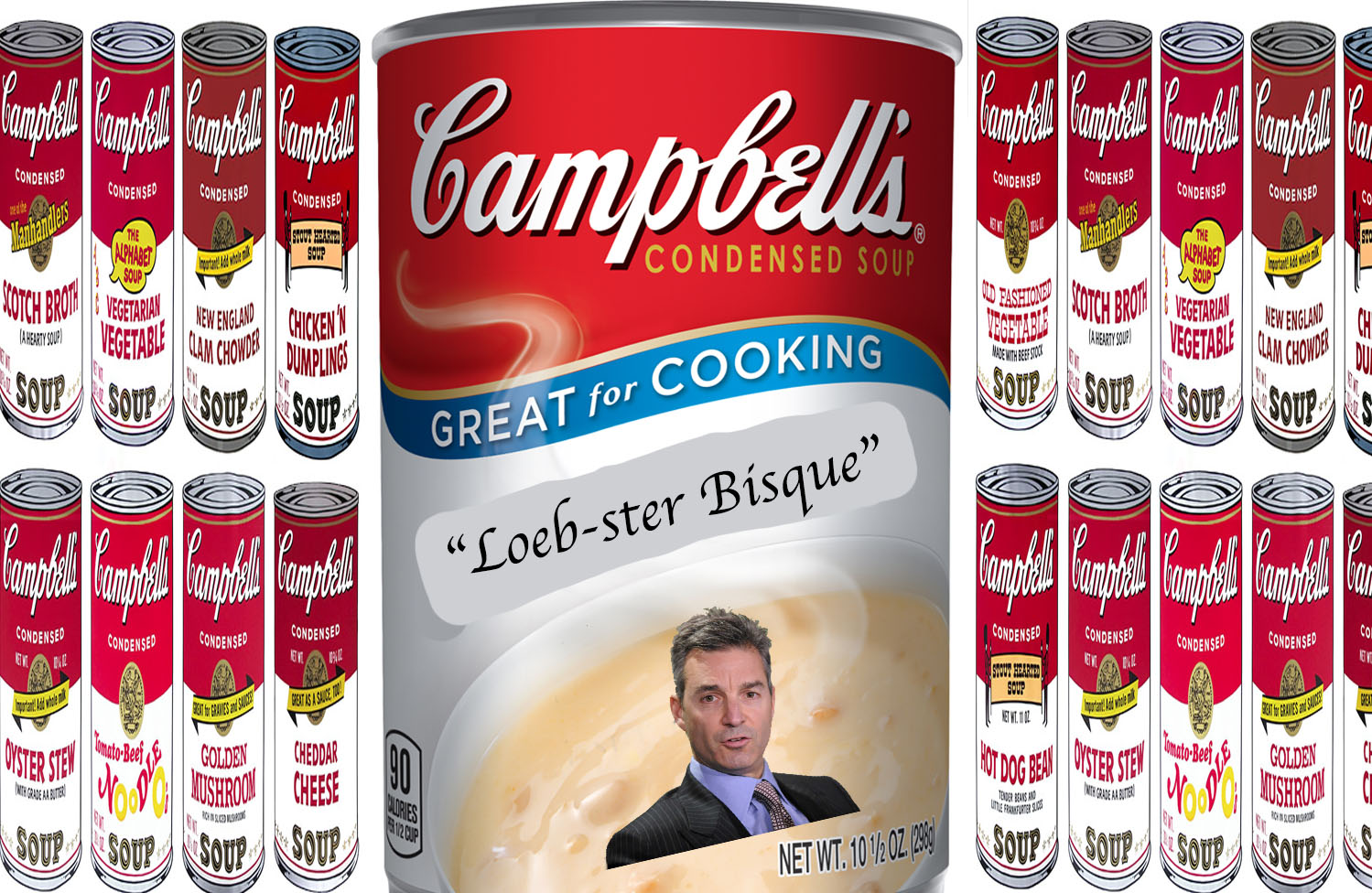The year, 1897. The place, the city of Camden, New Jersey. Joseph Campbell and Abraham Anderson enlist the help of their new canning company’s chemist, John T. Dorrance, to engineer the first ever condensed soup. Generation after generation following Dorrance’s invention, people the world over know and love Campbell’s Soup (CPB). The iconic red-and-white logo has become a cultural icon, appearing in Warhol paintings and on the cans of tomato soup the company is most known for.
After 149 years of nurturing our souls and warming our hearts, the fate of the company is being fought over between activist investor Daniel Loeb and the company’s current board members.
Loeb, who represents the interests of Third Point LLC, a hedge fund which owns 5.7% of the company, wrote a scathing letter tot he chairman of the Campbell’s (CPB) board, blaming them for how poorly the company has been performing over the course of the last year. The angered activist investor accused board members of “mismanagement, waste, ill-conceived strategy, and inept execution,” according to information gathered by CNN.
“The disappointing outcome of Campbell’s recent ‘strategic review’ process provides further evidence that this Board is unable or unwilling to take the bold action needed to address the current crisis. At this point, it would be simply reckless to leave the Board that caused this mess in charge of fixing it.”
–Daniel Loeb, activist investor, Third Point LLC.
When Loeb mentioned Campbell’s (CPB) “recent ‘strategic review’ process” in his letter, he is referencing the company’s decision to sell its subsidiary, Campbell Fresh, back in August. The health-food arm of the company owns Bolthouse Farms juices and Campbell’s line of refrigerated soups, as well as its international business. The decision followed poor sales back in May that resulted in a less-than-smooth transition during the company’s acquiring of snack maker Snyder’s-Lance.
In addition to the rough acquisition deal, Campbell’s (CPB) CEO Denise Morrison, who had been with the company since 2011, abruptly announced her retirement in May. Suffice to say, the company’s issues are a little more than a bowl of their signature chicken noodle can handle.
Back in July, Loeb sought out to convince family members related to the founders of the Campbell’s brand, all of which own a combined 41% of the company’s shares, to support a plan that would result in hiring a team of investment bankers to explore options for selling the company.
“I think Loeb is very methodical and smart. I don’t think the Dorrances [relatives of chemist John T. Dorrance] have run across someone like him before.”
-Anonymous Source
Like its fellow food industry competitors, Campbell’s (CPB) is fighting a losing battle with companies like Amazon (AMZN), Walmart (WMT), and Costco (COST) who, in recent years, have released their own lines of canned food products at a cheaper price for consumers. Recent fiscal reports indicate the company’s stock has dropped nearly 17% this year. As consumer interests shift from the traditional act of traveling to a supermarket to purchase groceries to simply ordering their food online and having it delivered, this trend presents a real danger for food companies and their investors.
While Dan Loeb wants nothing more than to gut the current board and sell the company for all the soup its worth, CNBC analysts suggest another option: “shed the company’s many brands and take the soup business private.” Taking the company private would alleviate much of the public pressure to perform, as well as give the company time to reassess its current standing and refocus for the future.
When a company goes public, they are pinned down with costs associated with security filings, controls, accounting, and other ledger items. Campbell’s (CPB) could save millions by going private, and not have to make hasty decisions solely meant to impress investors and shareholders.
“As a private company, you can say, we’re not going to overpay for acquisitions. We’re going to throw off a lot of cash because we are happy to be slow growth.”
–Erik Gordon, business professor, University of Michigan
Once private, Campbell (CPB) could step outside of the ring and catch its breath. Dan Loeb and his ravenous hedge fund would get a nice check, and the Dorrances would have the opportunity to pay down owed debts with cash flow from the deal while reworking the brand back to its original luster.
All signs point to the company’s potential decision to go private as “Mmm, Mmm, Good.





